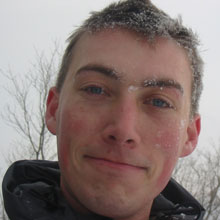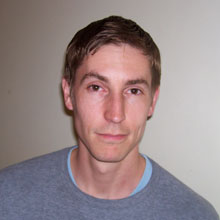If you looked at the resumes of Richard Hill and Mark Pankow, recipients of the 2007 ASEE Outstanding Student Instructor Award (OSI), you might think that time spent in industry and California were necessary qualities of a superior GSI. However, interviews with Hill and Pankow reveal a much wider range of traits possessed by great teachers.
 Both of the OSI recipients identified opportunity and involvement with students as a motivator for taking on the many and varied tasks of a GSI. Pankow states, “There are so many options within the Mechanical Engineering Department that you are not limited and the resources that you need can always be found.” He further explains that, “I’ve always had a desire to teach, that feeling that you get when you see the connections being made by students is indescribable.” The two GSI’s also reported on the positive experience of teaching in the ME department as well as the chance, in Pankow’s words to “reaffirm your understanding of the subject matter.”
Both of the OSI recipients identified opportunity and involvement with students as a motivator for taking on the many and varied tasks of a GSI. Pankow states, “There are so many options within the Mechanical Engineering Department that you are not limited and the resources that you need can always be found.” He further explains that, “I’ve always had a desire to teach, that feeling that you get when you see the connections being made by students is indescribable.” The two GSI’s also reported on the positive experience of teaching in the ME department as well as the chance, in Pankow’s words to “reaffirm your understanding of the subject matter.”
Both Hill and Pankow take great satisfaction from teaching and have clear ideas about the ideal student and the ideal GSI. Hill’s dream student is one whose “goal is to learn the material and gain intuition, rather than earn the most points.” Pankow describes the ideal learner this way, “one that is willing to come in with an open mind and not just looking for the answer but the reasons to why you do something and a deeper understanding of the subject matter.” The definition of a great GSI is, according to Hill, “someone who is technically competent in the material, is well prepared for office hours and section, has a body of experience with applications to draw from, is a good communicator, is friendly (not condescending), cares about the students and involves them actively in the learning process.” For Pankow the best student instructor needs “to be open minded, patient, and willing to go out on a limb for your students. I would also say that you have to be open to new ideas, because often you have to listen to students to see how they view things and then try to explain it to them with their understanding.” Other similarities shared by the two award winning instructors include an emphasis on communications skills, the breadth of a teacher’s knowledge base, and the lack of sufficient time, given other demands on their lives, to devote to students.
 Comments from students and professors alike uniformly praise Hill and Pankow. Prof. James Barber notes of Pankow “that he has a great talent for one-on-one instruction, striking a nice balance between friendliness and the necessity to guide the student to make the best use of homework activities to learn and consolidate the material.” Barber also points out, “The hard work for the nomination was done by Mark’s own students. This says a great deal bout the impression he has created and his commitment to teaching.” Prof. Dawn Tilbury describes Richard Hill this way. “I could always trust Rick to do an outstanding job…. He explains things in a straight forward manner, never skipping even a small step.” Hill’s students give him high praise. A typical comment comes from Alexandra Plonka. “He [Hill] could easily captivate the room with not only his knowledge of the material but also his presentation of it. It was clear that Rick spent time organizing the material beforehand so he could simplify the complex topics and explain them in a manner that was clear and easy for us to understand. Rick, also understood that the most important part of understanding technical topics is the ability to apply them, so he selected his example problems to reflect the concepts we needed to master.”
Comments from students and professors alike uniformly praise Hill and Pankow. Prof. James Barber notes of Pankow “that he has a great talent for one-on-one instruction, striking a nice balance between friendliness and the necessity to guide the student to make the best use of homework activities to learn and consolidate the material.” Barber also points out, “The hard work for the nomination was done by Mark’s own students. This says a great deal bout the impression he has created and his commitment to teaching.” Prof. Dawn Tilbury describes Richard Hill this way. “I could always trust Rick to do an outstanding job…. He explains things in a straight forward manner, never skipping even a small step.” Hill’s students give him high praise. A typical comment comes from Alexandra Plonka. “He [Hill] could easily captivate the room with not only his knowledge of the material but also his presentation of it. It was clear that Rick spent time organizing the material beforehand so he could simplify the complex topics and explain them in a manner that was clear and easy for us to understand. Rick, also understood that the most important part of understanding technical topics is the ability to apply them, so he selected his example problems to reflect the concepts we needed to master.”
So what’s different? Are Hill and Pankow clones? Hardly. While many traits are similar their own words quoted here demonstrate their different communication styles. Their subject matter interests vary. Hill’s interests lie in systems and controls design while Pankow’s are in Solid Mechanics and satellite design. Hill has a few more years of teaching experience than Pankow. Their current activities also differ. Hill is in Brazil on a research project where he expects to not only deepen his subject matter knowledge base but to increase his already considerable teaching skills by developing his understanding of “different cultures and how to communicate with people for whom English is not their first language.” Pankow will spend the summer working for GE in upstate NY gaining practical experience that will allow him to “relate everything of the real world back to the students and explain how things really work instead of just what a book says.”
Despite individual differences, the similarities that distinguish Hill and Pankow as great instructors still dominate. Both Hill and Pankow expressed the desire to eventually work as a professor at a college or university where the emphasis is on instruction over research. Profs Tilbury and Barber echoed that desire. Tilbury is “confident that he [Hill] will achieve that goal,” of a teaching professorship. Barber hopes for Pankow, “above and beyond this award that he goes on to use his skills in an academic setting.”
Clearly the ASEE awards received by Richard Hill and Mark Pankow were well deserved. The ME department is lucky to have on staff committed teachers like Hill and Pankow. But the students benefit most from the skill and dedication of these two superior communicators and subject matter experts with clear visions for their futures.